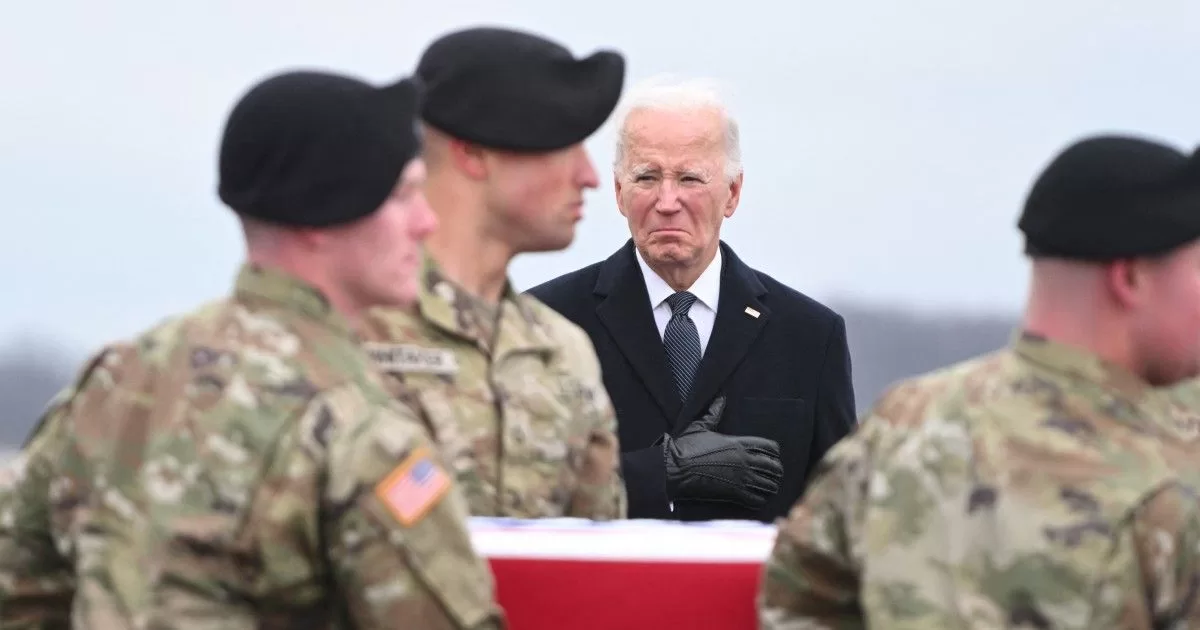MIAMI.- The tension in the Middle East It intensifies, after the United States bombings this Friday against pro-Iranian groups in Syria and Iraq, in response to the death of three American soldiers after attacks on a military base in Jordan.
The US attack against more than 85 targets inside Iraq and Syria had a duration of around 30 minutes and left at least 24 pro-Iran militiamen dead in Syria and another 16 dead in Iraq, among them civilians, according to figures from the Syrian Observatory for Human Rights (OSHD) and the Iraqi government.
The Washington bombings, which occurred almost a week after the drone attack on Jordan’s Tower 22 base near the Syrian border, destroyed at least 26 important sites that housed pro-Iranian cells and served as weapons depots.
After the attack, President Joe Biden sent a message to the enemies of the United States, who seek to harm the country and its citizens: “If you hurt an American, we will respond (…) Our response began today. It will continue at the times and places we choose.”
The US did not attack Iran
However, the president refrained from directly attacking Iranas some Republicans demanded, and he also did not address Iranian citizens, as Donald Trump did in 2020, when he ordered the attack that ended the life of General Qasem Soleimani, in charge of the foreign operations of the Guardians of the Revolution, in Baghdad.
The Democratic president instead directed this attack against the elite Quds Force of Iran’s Islamic Revolutionary Guard Corps and linked militia groups.
Biden maintains that the country “does not seek conflict” in the Middle East. This statement is confirmed by government officials, making it clear that they do not want a direct war with Iran.
International alarm
The US attacks raised alarm bells in the international community, which rejected the Biden administration’s retaliation in the face of a possible escalation of violence in the region.
Josep Borrel, high representative of the European Union for Foreign Affairs, called to prevent the situation in the region from becoming “explosive”, after the American attack and the Israeli response in Rafah, south of Gaza.
Borrell considers that the Middle East is “a pot that can explode” in the face of fighting between Israel and Lebanon, in Syria, Iraq and in the Red Sea, where the Houthis, an insurgent group that controls much of Yemen, have launched a wave of attacks against commercial vessels in “solidarity” with the Palestinians in Gaza , governed by the Islamic terrorist group Hamas.
“Everyone should try to prevent the situation in the region from becoming explosive,” he said, upon arriving at the informal meeting he is holding in Brussels with the EU foreign ministers.
Tension in the Middle East
Iran, Russia and Hamas They also spoke out against US retaliation. The first called the attack a “strategic error” and warned that it could “aggravate tensions and instability in the region.”
Russia, for its part, accused Washington of “sowing chaos and destruction” in the region and generating “hotspots of tension” from Finland to the Suez Canal and from Libya to Afghanistan.
These attacks demonstrate “once again to the entire world the aggressive nature of US policy in the Middle East and Washington’s total disregard for international law,” said Russian Foreign Ministry spokesperson Maria Zajárova, while requesting an urgent meeting with the UN Security Council.
While Hamas indicated that the US attacks only add to its “fuel to the fire” to the conflict in Gazawhich has generated more than 165 drone and rocket attacks against US soldiers deployed with the anti-jihadist coalition in Iraq and Syria.
In addition, he held the US responsible for the “consequences” that these actions may entail.
Could tensions lower?
Despite the fear and warnings of some pro-Iranian countries and allies, Hussein al-Mosawispokesman for Harakat al-Nujaba, one of the main Tehran-backed militias in Iraq, hinted at a desire to “de-escalate” tensions in the region.
Although he considered that the US must “understand that every action provokes a reaction,” in an interview with the news agency Associated Press in Baghdad Mosawi assured that they do not want “escalate or amplify regional tensions”.
He also indicated that the areas attacked in Iraq were generally “devoid of combatants and military personnel at the time of the attack.” This suggestion of minimizing the damage caused by the US attack, according to AP, would allow it to “justify” the lack of a strong response.
Source: With information from AP / AFP / BBC

